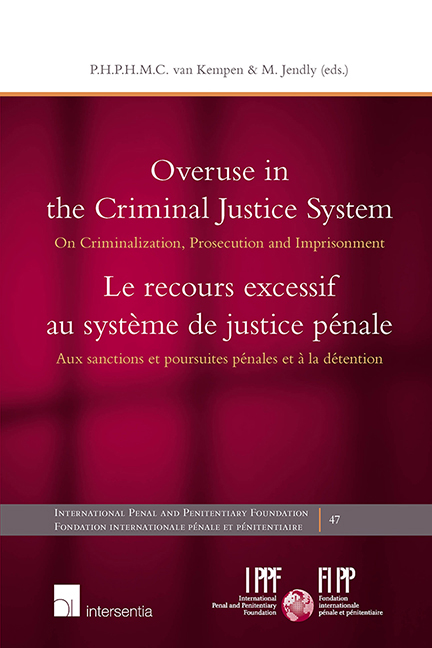Book contents
- Frontmatter
- Dedication
- Contents
- Acknowledgements
- Remerciements
- PART I INTRODUCTORY SYNTHESIS AND ANALYSES 1ÈRE PARTIE. SYNTHÈSE ET ANALYSES INTRODUCTIVES
- PART II THEMES 2ÈME PARTIE. THÈMES
- PART III NATIONAL REPORTS 3ÈME PARTIE. RAPPORTS NATIONAUX
- Overuse in the Criminal Justice System in Argentina
- Le recours au système de justice pénale en Belgique: état des lieux et perspectives
- Overuse of Criminal Law in Finland
- Overuse in the Criminal Justice System in Germany
- Overuse in the Criminal Justice System in Greece
- Overusing the Criminal Justice System: the Case of Ireland
- Overuse in the Criminal Justice System in Japan
- Tendencies of Overuse in Criminal Law Policy and Criminal Law Enforcement in the Netherlands
- Overuse in the Criminal Justice System in New Zealand
- Overuse in the Criminal Justice System in Nigeria
- Overuse in the Criminal Justice System in Poland
- Overuse in the Russian Criminal Justice System
- Overuse in the Criminal Justice System in Spain
- Recourt-on de manière excessive au système pénal en Suisse?
- Overuse of the Criminal Justice System in Taiwan
- Overuse and Underuse of the United States Criminal Justice System in the Area of Business Crimes
- The International Penal and Penitentiary Foundation: history and purpose
- La Fondation internationale pénale et pénitentiaire: histoire et objectif
- The IPPF Series
Overuse in the Criminal Justice System in Spain
from PART III - NATIONAL REPORTS 3ÈME PARTIE. RAPPORTS NATIONAUX
Published online by Cambridge University Press: 26 June 2019
- Frontmatter
- Dedication
- Contents
- Acknowledgements
- Remerciements
- PART I INTRODUCTORY SYNTHESIS AND ANALYSES 1ÈRE PARTIE. SYNTHÈSE ET ANALYSES INTRODUCTIVES
- PART II THEMES 2ÈME PARTIE. THÈMES
- PART III NATIONAL REPORTS 3ÈME PARTIE. RAPPORTS NATIONAUX
- Overuse in the Criminal Justice System in Argentina
- Le recours au système de justice pénale en Belgique: état des lieux et perspectives
- Overuse of Criminal Law in Finland
- Overuse in the Criminal Justice System in Germany
- Overuse in the Criminal Justice System in Greece
- Overusing the Criminal Justice System: the Case of Ireland
- Overuse in the Criminal Justice System in Japan
- Tendencies of Overuse in Criminal Law Policy and Criminal Law Enforcement in the Netherlands
- Overuse in the Criminal Justice System in New Zealand
- Overuse in the Criminal Justice System in Nigeria
- Overuse in the Criminal Justice System in Poland
- Overuse in the Russian Criminal Justice System
- Overuse in the Criminal Justice System in Spain
- Recourt-on de manière excessive au système pénal en Suisse?
- Overuse of the Criminal Justice System in Taiwan
- Overuse and Underuse of the United States Criminal Justice System in the Area of Business Crimes
- The International Penal and Penitentiary Foundation: history and purpose
- La Fondation internationale pénale et pénitentiaire: histoire et objectif
- The IPPF Series
Summary
INTRODUCTION
The Spanish penal system is strongly established on the principle of legality and comes from a codification tradition, based on the classical liberal criminal law, which could be classified as a procedural justice system. As a fundamental principle of modern continental criminal law, the principle of legality implies that in our system both behaviours considered criminal and the punishments to be imposed (with minimum and maximum limits) are previously and explicitly set out in the law, including all facts to be taken into account when sentencing: degrees of participation and execution of crime, concurrent offences, mitigating and aggravating circumstances, exoneration of criminal liability, etc. Law also contains provisions on how imposed penalties are enforced, and under which conditions this enforcement can be suspended or a penalty can be replaced, as well as cases in which parole and open regime can be granted. Spanish judges are bound by some rules that limit the room for discretion in the imposition of sanctions, and their subsequent enforcement. In addition, in recent years there is a tendency to carry out penal reforms very often. During its twenty years of existence, the Spanish penal code has already been modified more than 30 times, on an average of more than one penal reform by year. Most of them have increased punitiveness by widening the categories of crimes, raising the penalties, and making the penitentiary system less flexible, especially for some criminal offences, all leading to a very high prison population.
The results of a recent thorough study of each stage of the Spanish penal system show that the model of law and order is displacing the procedural justice system. As a result, it is unlikely that decriminalization policies will be carried out in the immediate future. As it will be highlighted in this report, although there are no alarming crime figures in Spain and experts consider it appropriate to decrease punitive pressure in some areas, it seems that this could only happen for utilitarian reasons, within a context of economic crisis that makes it unsustainable to maintain such a high prison population.
The results of a recent thorough study of each stage of the Spanish penal system show that the model of law and order is displacing the procedural justice system. As a result, it is unlikely that decriminalization policies will be carried out in the immediate future.
- Type
- Chapter
- Information
- Overuse in the Criminal Justice SystemOn Criminalization, Prosecution and Imprisonment, pp. 541 - 560Publisher: IntersentiaPrint publication year: 2019



